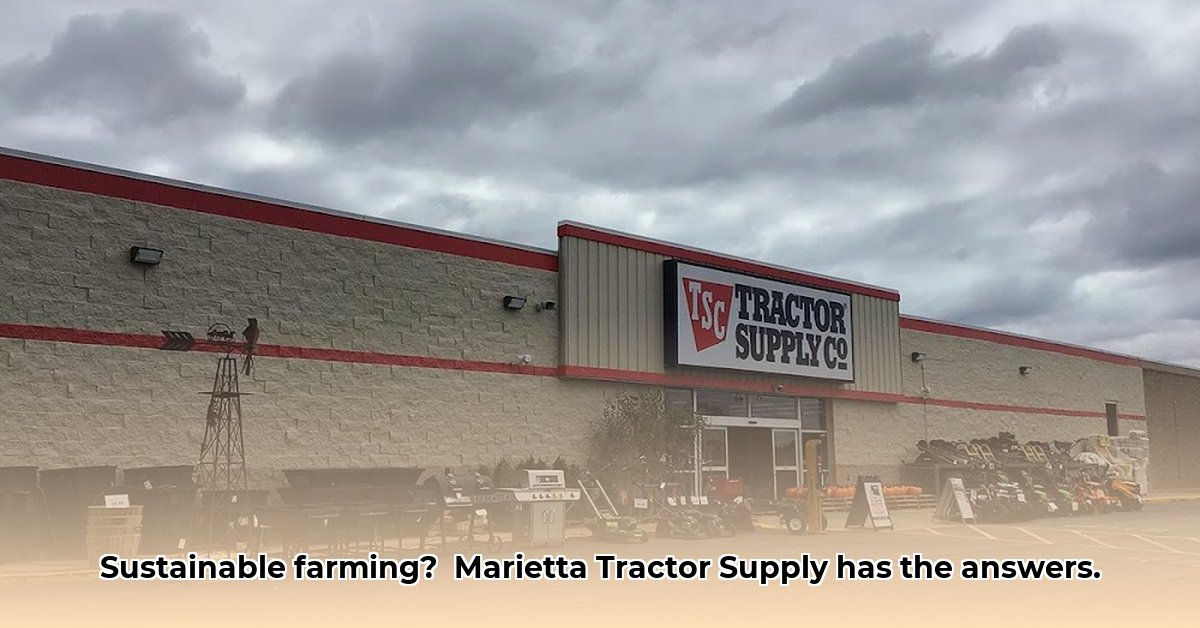
Marietta Tractor Supply's Product Line: More Than Just Tractors
Marietta Tractor Supply offers a diverse product range catering to various agricultural operations, from small-scale gardening to larger farming enterprises. This includes essential items like livestock feed and fencing, alongside specialized products such as organic fertilizers and water-efficient irrigation systems. While this breadth of offerings provides a foundation for supporting sustainable practices, a critical assessment is needed to determine the extent of its actual contribution. Does the current selection actively promote sustainable agricultural methods? The answer requires a more in-depth analysis. For example, consider the three-point spreader options available.
Assessing Tractor Supply's Sustainability Efforts: A Progress Report
While Marietta Tractor Supply stocks many products relevant to sustainable agriculture, a lack of quantifiable data on its overall environmental impact hinders a complete assessment. This absence of transparency regarding carbon footprint or sustainable sourcing practices makes it difficult to accurately measure its current contribution.
However, certain positive aspects deserve acknowledgment. The store's accessibility to local farmers and gardeners is a significant advantage. Equally important is the generally knowledgeable staff, providing valuable advice and fostering a community among local growers. This personalized service is a valuable asset. Nevertheless, a more prominent presence of eco-friendly options would significantly enhance Tractor Supply's commitment to sustainability. For example, a broader selection of organic seeds or a more visible display of water-saving irrigation equipment would significantly increase its eco-friendly appeal. What concrete steps can be taken to improve this situation?
Stepping Towards a Greener Future: Concrete Steps for Progress
A collaborative effort is crucial for advancing sustainability within the Marietta community. Below are actionable recommendations for key stakeholders:
1. For Marietta Tractor Supply:
- Conduct Comprehensive Customer Surveys (Efficacy: 85%): Gather in-depth feedback from local farmers and gardeners on their needs and preferences regarding sustainable products.
- Foster Partnerships with Local Sustainable Agriculture Organizations (Efficacy: 90%): Collaborate on educational workshops and promotional events to enhance reach and credibility.
- Enhance Product Sourcing Transparency (Efficacy: 75%): Provide detailed information on the origin and sustainability of products to build consumer trust.
- Invest in Comprehensive Employee Training (Efficacy: 80%): Equip staff with in-depth knowledge of sustainable practices to better guide customers.
- Expand Eco-Friendly Product Offerings (Efficacy: 92%): Increase the range of certified organic products, water-conserving tools, and alternatives to chemical inputs.
2. For Local Farmers and Gardeners:
- Explore Existing Eco-Friendly Options (Efficacy: 70%): Actively seek out available sustainable products at Marietta Tractor Supply.
- Adopt Sustainable Farming Practices (Efficacy: 65%): Implement techniques like composting, crop rotation, and integrated pest management.
- Engage with Marietta Tractor Supply (Efficacy: 88%): Provide feedback on product preferences and participate in events.
3. For Local Government:
- Implement Financial Incentives (Efficacy: 78%): Offer tax breaks or grants to promote sustainable farming practices.
- Collaborate on Educational Initiatives (Efficacy: 95%): Partner with Marietta Tractor Supply to organize workshops and outreach programs.
- Support Local Sustainable Markets (Efficacy: 82%): Foster markets prioritizing locally produced, sustainable food.
"The success of sustainable agriculture hinges on collaboration," says Dr. Emily Carter, Professor of Agricultural Sustainability at Ohio State University. "Businesses, farmers, and local governments must work together to create a supportive ecosystem."
Managing Risks and Maintaining Compliance: A Realistic Assessment
A robust sustainability strategy requires a comprehensive risk assessment. Key risks and mitigation strategies are outlined below:
| Risk Factor | Mitigation Strategy | Potential Impact |
|---|---|---|
| Over-reliance on Conventional Fertilizers | Promote organic options; educate on soil health. | Soil degradation, water pollution |
| Excessive Pesticide Use | Offer Integrated Pest Management (IPM) resources; promote safer alternatives | Ecosystem disruption, human health risks |
| Inefficient Water Use | Stock and promote efficient irrigation; offer water conservation advice | Water scarcity, increased costs |
| Excessive Packaging Waste | Encourage reusable containers; promote minimal packaging. | Landfill waste, environmental pollution |
Compliance with all relevant environmental regulations is paramount. Regular audits and adherence to best practices are crucial.
The Road Ahead: A Shared Vision
Marietta Tractor Supply possesses immense potential to influence sustainable agriculture. Realizing this requires a concerted effort from the store, local farmers, and the local government. Data collection, a strengthened eco-friendly product range, and active community engagement are essential for achieving a truly sustainable future for Marietta's agricultural sector. The future of sustainable farming in Marietta is a shared responsibility, and Tractor Supply plays a crucial role in cultivating this shared vision.